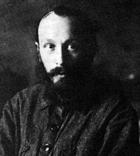
(Mikhail Mikhailovich Bakhtin, Orel, 1895 - Moscow, 1975) Russian literary theorist, also known by his pseudonym V. Voloshinov or Voroshilov. After graduating from the Saint Petersburg State University, Bakhtin moved to Vitebsk, important cultural center of the time, where he organized along with other intellectuals an important forum for debate on art and literature. In 1929, he was arrested and deported to Kazakhstan.Known for its analysis of dialogic and polyphonic nature of literary production, occupies a central place in the theory of literature from the recognition of his work in the West with the reissue in 1963 the book Problems of Dostoevsky's poetics (1929) . Bakhtin exceeded formalist criticism, which prevailed in the Russia of his time and advocated the existence of art and literature as independent entities outside world, in favor of a conception for the language, form and content are collected by the Figure of an author, endowed with a history and an imaginary individuals, which convert every work in a singular way of expression.After his initial work on F. Dostoevsky, Bakhtin's work spans three thematic cycles. One sociological and Marxist, which publishes under the pseudonym V. Voloshinov books Freudianism (1927) and Marxism and the Philosophy of Language (1929), which precludes a subjective psychology and linguistics, to vindicate the importance of the social




